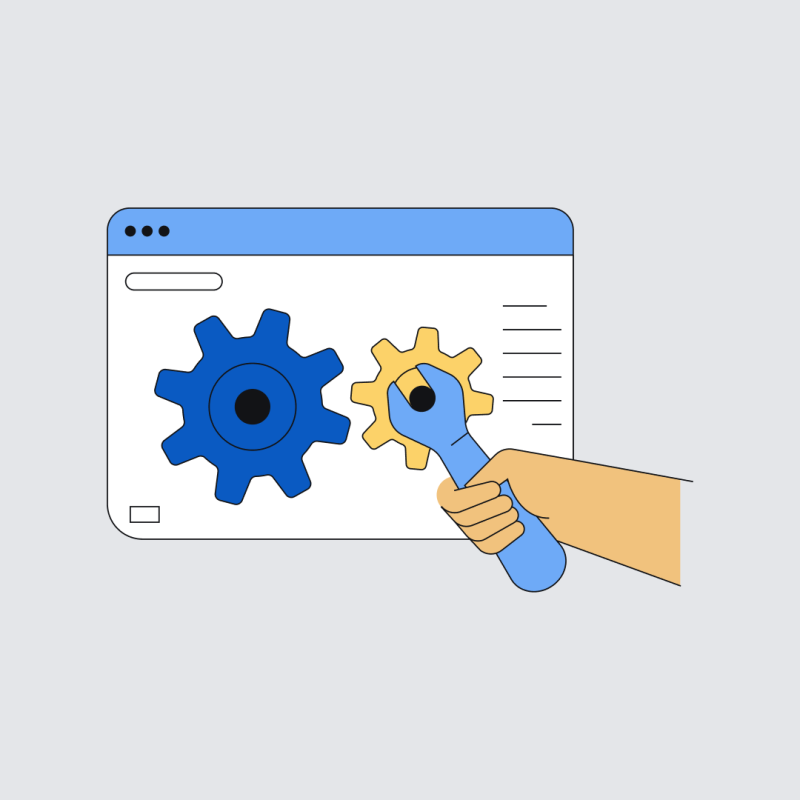Thankfully, numerous software, services, and web-based tools have emerged in recent years to help automate some (or all) of that bookkeeping work.
Here, we’ll go over what to look for in an automated bookkeeping solution and how to make sure it’s right for your business.
What does “automated bookkeeping” mean?
Unless your business has dozens of employees or millions in annual revenue, it probably doesn’t make much sense to hire a full-time in-house bookkeeper just yet.
If you’re just starting out and don’t have many expenses to track, you could go the DIY route and use a spreadsheet, or our handy Excel Income Statement template—but those solutions can are prone to human error.
Automated bookkeeping solutions and services fall somewhere between those two extremes, using a combination of software tools and people-powered bookkeeping services to automate as much of the manual work involved in bookkeeping as possible.
In addition to compiling all your business transactions for you and eliminating a significant amount of manual data entry, these solutions also give you simple software tools to produce financial statements, track expenses, and help make tax time a breeze.
What features should an automated bookkeeping system have?
The kind of automated bookkeeping system you use will depend on what kind of accounting system your business already uses—cash-basis or accrual—what your bookkeeping and accounting needs are, and how much you’re willing to pay.
In general, however, most automated bookkeeping solutions will do the following:
1. Expense management and transaction categorization
Most modern expense tracking software falls under the category of “automated bookkeeping,” and the way it works is fairly straightforward.
Simply provide your banking information, and the software will automatically scan your credit card and bank account statements and upload them—fully categorized—into an expense tracking system.
Properly categorizing and recording your transactions helps you catch more deductions, which will make your life easier if you ever get audited by the IRS, and generally makes looking through your financial records a much less painful experience.
Although tools like Mint and Quickbooks Online were among the first apps offering this kind of functionality, newer tools like Expensify and Benchhave also become favorites among startups and small business owners looking for a lower-cost automated bookkeeping solution.
2. Generate financial statements
Expense tracking is only one aspect of bookkeeping. Any automation software or bookkeeping service you choose should also generate financial statements for you, like income statements, balance sheets, and cash flow statements.
Keep in mind that unlike the expense tracking tools mentioned above, automated bookkeeping services are built out for full-blown bookkeeping and accounting. If you’re choosing DIY accounting software, you may want to consult with an accountant to make sure you’re setting everything up properly.
3. Give you tax-ready financials
Did you know that the IRS requires you to keep records and receipts for any expenses you claim on your taxes at least three years after filing the return?
A great way to avoid breaking this rule, while also saving time on your bookkeeping, is to digitize and keep all your transaction records in one system—another advantage to automating your bookkeeping process.
Accounting automation and bookkeeping software can drastically cut down the amount of time you spend getting your business tax time-ready in general by:
- Automatically categorizing and flagging potential deductions
- Keeping all tax records together in one place
- Cutting down on the amount of time spent hunting down receipts, invoices and other important tax-time records
Benefits of automated bookkeeping
Automating your bookkeeping workflows can be a game-changer for small businesses strapped for time and cash. Some specific benefits include:
1. Cut down on the potential for human error
Recording, categorizing and reconciling your transactions involves moving a lot of data from one place to another. No matter how much care and attention you put into this work, the risk of making a simple mistake is always there—which is exactly what makes automated bookkeeping solutions so attractive.
Automating your bookkeeping adds an additional layer of certainty into your bookkeeping process by cutting down on human error, leaving you with financial data that is more reliable and giving you greater peace of mind.
2. Get real-time insight into your finances
Automated bookkeeping isn’t just more reliable: it’s also faster. Instead of waiting for the end of the month, automated solutions mean you can get real-time insight into the state of your finances, allowing you to make important business decisions faster and with more confidence.
3. Spend less time doing repetitive tasks
Automation is all about letting software take care of repetitive work and leaving you more time for running your business—and automated bookkeeping is no different.
If you’ve previously done your bookkeeping manually, you probably already set aside some time every week or month to take care of your books.
With automated bookkeeping, you can spend less of that time copying and pasting numbers in and out of spreadsheets and more time on higher-value tasks like generating financial statements, gauging the health of your business as a whole, and making strategic business decisions that impact your long-term success.
The bottom line
Automated bookkeeping is an excellent solution for entrepreneurs who are strapped for time and looking for a way to cut down on the repetitive work associated with maintaining your books.
The right automated bookkeeping solution should allow you to streamline your bookkeeping process from start to finish, without requiring weeks of time up front to learn a new software system. Implemented correctly, automated bookkeeping can cut down on human error, give you real-time insight into the state of your company’s financial position, and also leave you more time to focus on higher-value activities—all of which will put your business in a stronger position in the long term.

